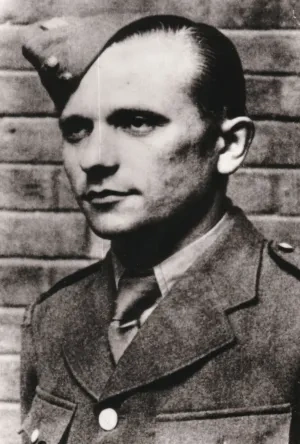Gabčík, Jozef
Gabčík, Jozef (8 April 1912, Rajecké Teplice, today's Slovakia – 18 June 1942, Prague, today's Czech Republic) — Slovak soldier in the Czechoslovak Army involved in the assassination of Reinhard Heydrich (Operation Anthropoid).
Jozef Gabčík was born into a relatively wealthy peasant family. In October 1932, he began military service in the 14th Infantry Regiment in Košice and subsequently graduated from the non-commissioned officers' school in Prešov. Despite his father's disapproval, he continued his military career after mandatory service. He served in the army until March 1937, when his voluntary contract expired (at his father's insistence he did not renew it). He maintained contact with the army, however, as he kept working in a factory in Žilina that produced combat gases, until he was injured in an accident involving direct exposure to these gases. After recovering, he worked in a chemical warfare warehouse in Skalka nad Váhom. This incident proved to be a pivotal moment in his life. After the dissolution of Czechoslovak Republic (Československá republika, ČSR), when German Wehrmacht representatives arrived to seize the warehouse, Gabčík refused to relinquish control without receiving proper orders from his superiors. Following their departure, he then sabotaged the gas tanks. After this act, Gabčík decided to go into exile. He left for Poland, and on 5 May 1939, in Kraków, he enlisted in the forming Czechoslovak army-in-exile. Here he also met Jan Kubiš.
Since, at that time, the Polish government was not very interested in forming a Czechoslovak army-in-exile on its territory, Gabčík, along with others, left for France at the end of July 1939 on the ship Chrobry. In France Gabčík joined the French Foreign Legion. After the outbreak of the Second World War, in accordance with previous agreement between the government of the French Republic and the Czechoslovak representatives, Czechoslovak soldiers were released from the Foreign Legion. They subsequently joined the Czechoslovak army-in-exile. Jozef Gabčík was accepted into it on 26 September 1939 in the camp in Agde and with the rank of sergeant, he took part in the fighting in France. After the defeat of France, he left on the Rod el Farag ship for Great Britain.
He was awarded the Czechoslovak War Cross 1939 (Československý vojnový kríž 1939) on 28 October 1940 for his bravery in combat. In the summer of 1941, he agreed to enlist for special training conducted in cooperation with the British Special Operations Executive (SOE). Jozef Gabčík completed various special courses (e.g., parachute, sabotage, etc.) after which he became one of the first Czechoslovak soldiers to volunteer for special tasks in the occupied homeland. In October 1941, he became the commander of Operation Anthropoid (operácia Antropoid), the goal of which was to carry out the assassination of the Deputy Protector of the Protectorate of Bohemia and Moravia (Protektorát Čechy a Morava) SS-Obergruppenführer Reinhard Heydrich. Due to an injury sustained by the second group member, Karel Svoboda, who was subsequently replaced by Gabčík's friend Jan Kubiš, as well as unfavorable flying conditions over occupied Europe, their landing experienced several delays. Finally, on 29 December 1941, at 02:24 a.m., near the village of Nehvizdy near Prague, the Anthropoid group was dropped alongside members of two other distinct mission groups, Silver A and Silver B.
The Operation Anthropoid party, unlike the others, managed to establish contacts with the local resistance. With the assistance of various resistance members, including those from the Sokol movement (a gymnastics organization that also had many members involved in the resistance) they successfully planned and executed the assassination of R. Heydrich on 27 May 1942. Following the act, they took refuge in different hiding places, managing to elude the Gestapo, who lacked substantial information about their whereabouts for an extended period. The situation shifted when Karel Čurda, a member of Operation Out Distance (a different sabotage group that had also been parachuted into the protectorate in 1942) surrendered to the Gestapo. Čurda had met with members of the Anthropoid group in Prague and was aware of Gabčík and Kubiš's locations. Thanks to information from Čurda and the subsequent brutal interrogation of the arrested resistance fighters, the Gestapo obtained information about the hiding place in the Orthodox Church of St. Cyril and Methodius on Resslova Street in Prague. After offering resistance, against overwhelming odds, for several hours, Jozef Gabčík committed suicide on 18 June 1942. Other resistance fighters Adolf Opálka, Jan Kubiš, Josef Valčík, Josef Bublík, Jan Hrubý and Jaroslav Švarc perished that day with him. The death of R. Heydrich triggered a series of brutal retaliatory actions by SS troops, which included the obliteration of entire villages and large-scale civilian massacres, most notably the Lidice massacre.
The successful assassination of R. Heydrich and the brutal wave of mass reprisals in the Protectorate provoked a great international response which representatives of the Czechoslovak government-in-exile were able to use to promote Czechoslovak demands in negotiations with the Allies. One historical fact confirming the success of their action is that Great Britain withdrew its signature from the Munich Agreement on 5 August 1942. Subsequently, on 29 September 1942, the French National Committee followed suit, also withdrawing its signature from the agreement.
